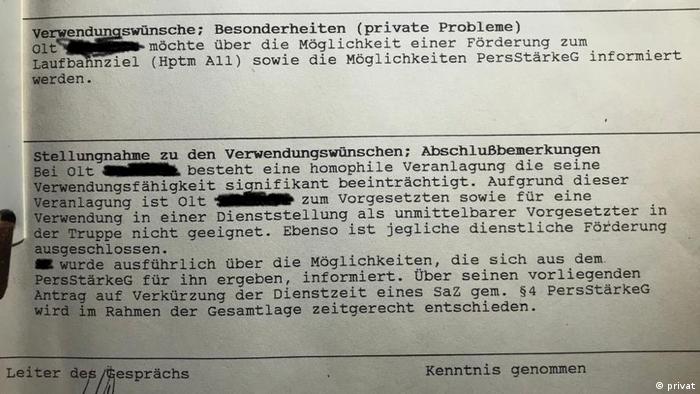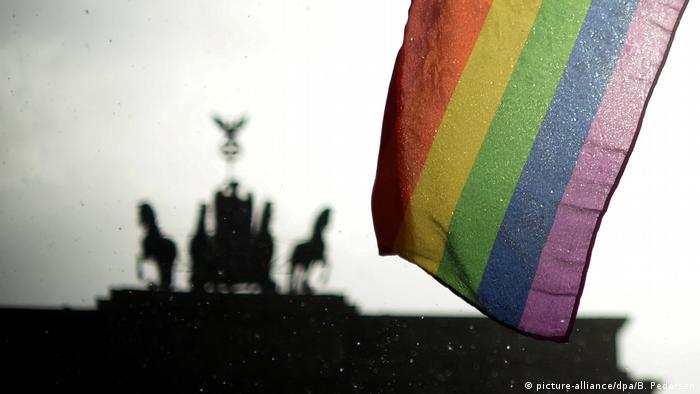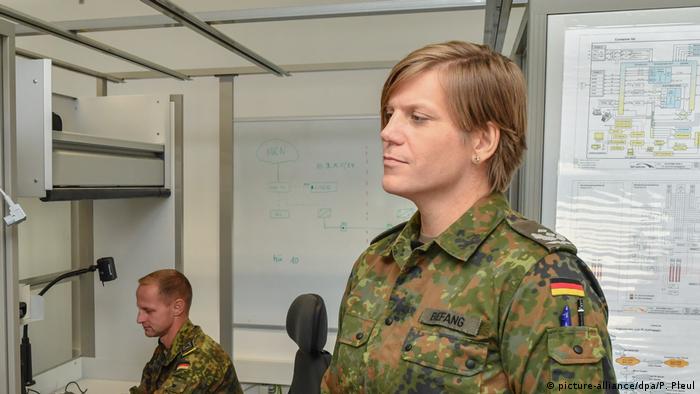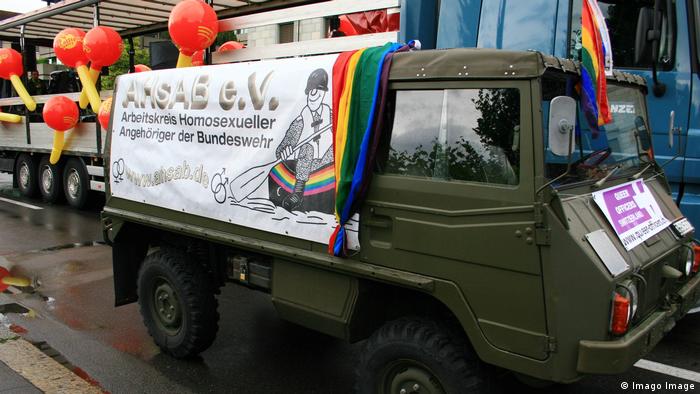Gay German Soldiers Say an Apology is Not Enough For Being Degraded As Human Beings
As the 50th annual Pride month drew to an unspectacular close amid the coronavirus crisis, German LGBT+ rights activists marked another anniversary: Homosexual soldiers were first allowed to serve openly in the Bundeswehr, Germany's armed forces, from July 3, 2000, onward.
Ahead of the 20-year anniversary, last week the Defense Ministry vowed to launch a rehabilitation program for members of the armed forces who have faced discrimination due to their sexual orientation or gender identity since the law was changed in 2000. Soldiers were granted still more legal protection in 2006 with the passing of the General Equal Treatment Act.
What is less clear is how and whether soldiers who served before 2000 — when discrimination against homosexual servicemen was not only part of daily life but also perfectly legal — will see either rehabilitation or financial compensation. The modern Bundeswehr presents itself as a diverse employer where "discrimination of any kind is not tolerated," but the effects of homophobic and transphobic regulations are well within living memory for both former and current members of the armed forces.
Medical exams for gay soldiers
"I felt degraded as a human being," one former first lieutenant, who wished only to be identified as Chris, told DW. Chris served from 1982 to 1992, when he applied for early discharge partly owing to discrimination he had faced as a gay man.
At the time, the issue was under scrutiny in then-West Germany. A public scandal had erupted in 1984 after General Günter Kiessling had been accused of being gay and was suspended from his role.
Chris was "urged" to undergo a medical examination in 1987 after he chose to come out to his superiors, and was met with outright anti-gay sentiment by the examining physician.
"The military doctor in charge introduced himself by saying he had issues with 'people like me' but officially had no choice as he was ordered to examine me," Chris explained. In what he described as a "restricted" part of a military hospital "where mentally ill people are treated," Chris underwent a CT scan of his brain, drug and syphilis screenings, and had to attend psychological counselling sessions — where a sympathetic therapist allowed him to play chess or read a newspaper as he saw no purpose in the sessions.
Barred from authority
Until 2000, Bundeswehr policy held that putting gay soldiers in positions of authority would lead to poor morale and could even pose a security risk. The World Health Organization identified homosexuality as a mental illness through 1992, while in Germany the notorious Paragraph 175 made sexual acts between two men a crime until 1994. Around 140,000 men were convicted under the law.
In his official HR review after the medical exams, Chris was described as "possessing a homophile disposition which significantly impairs his utility. Because of this disposition he is not suitable for an authority role. Likewise, any promotion within the service should be rejected."

The 1988 medical report advising against giving Chris,
then a Bundeswehr soldier, a position of authority on the grounds
that he was homosexual
"He has been informed in detail about the opportunity [...] for a reduction of his period of service," the report concluded.
"I think my pride as an officer broke during the [medical examinations]," Chris said. He decided that if his promotion to captain was impossible he could not stay in the army. Chris was denied promotion yet again, and then left the Bundeswehr two years earlier than planned, taking an opportunity for early discharge available owing to German reunification.
Germany's first transgender officer
Another LGBT+ officer, who joined the armed forces shortly after Chris left, had a markedly different experience of coming out. Battalion commander Anastasia Biefang, vice chairperson of LGBT+ advocacy group Queer BW, came out as a transgender woman at the age of 40 in 2015 after over 20 years of service. She was the first openly transgender officer appointed to this position in the German armed forces.
"I received active support about coming out from people across the board in my professional environment," she told DW. "I was asked if I wanted to change anything about my job, but I didn't want to." For Biefang, there was never any question of being pushed out of a role.
When she began her service in 1994, women were still not permitted to serve in the armed forces apart from in the medical sector. The discriminatory laws changed in 2000, after which time openly gay men were allowed into leadership positions, and as of 2001, women's roles were expanded. Biefang said the Bundeswehr then became more inclusive, to the extent that by 2015 she could be open about her gender identity.
"I was never actively discriminated against before that — but I never came out before that," she said. "Until about two years before coming out, people still said I should not do it as it would be bad for my career."
'The journey from words to action'
Queer BW (formerly the Working Group for Homosexual Members of the Bundeswehr) was set up in 2002. The group has called for an official rehabilitation and apology from the defense ministry for 18 years, but Biefang still said she was "surprised" when Defense Minister Annegret Kramp-Karrenbauer announced last week that the ministry would launch a rehabilitation program and acknowledge past wrongs.
"This policy is the cornerstone of who we are," Biefang said. "We are closely watching the journey from words to action." She believes the ministry is "sincere" in what it is doing and is consulting with current and former soldiers, and Queer BW.
For Chris, who may be among those eligible for rehabilitation, the policy is something he welcomes.
"To be honest I never thought this would happen so many years later. It fills me with a belated pride in my home country, Germany, and fosters my belief in the robustness of democracies," he said. "Sometimes it just takes a long time."
Challenges of dealing with historical cases
The defense ministry was unable to provide DW with information about how historical discrimination cases from before the year 2000, such as Chris', fit into the policy — as it does not compile such statistics. A recently commissioned study on the treatment of homosexual soldiers from 1955 to 2000 is due to be published in the next few months.
"What the policy may not address is those people who never came out," Biefang explained. The fact that gay men could not actively and openly serve no doubt stifled many careers — but proving this and providing compensation is far from clear-cut.



Comments